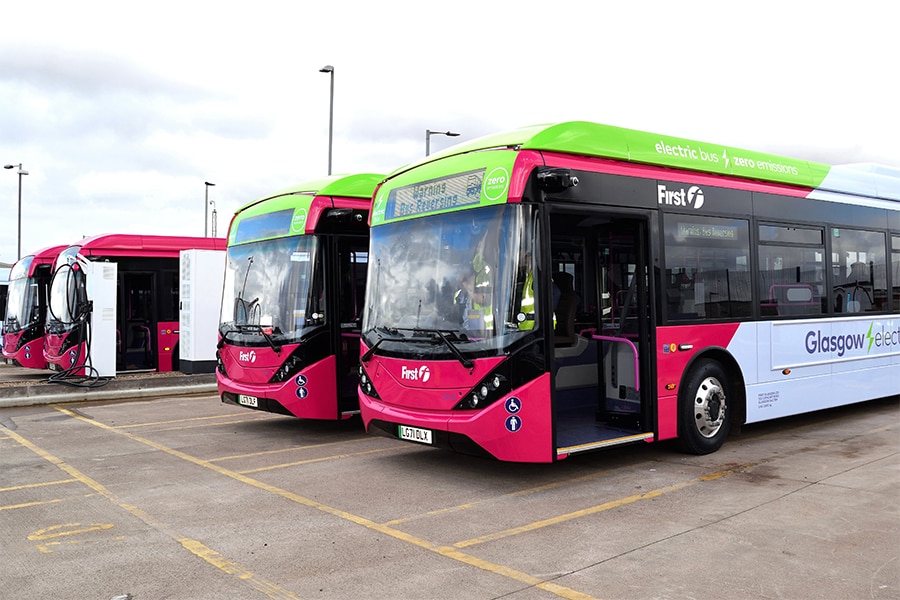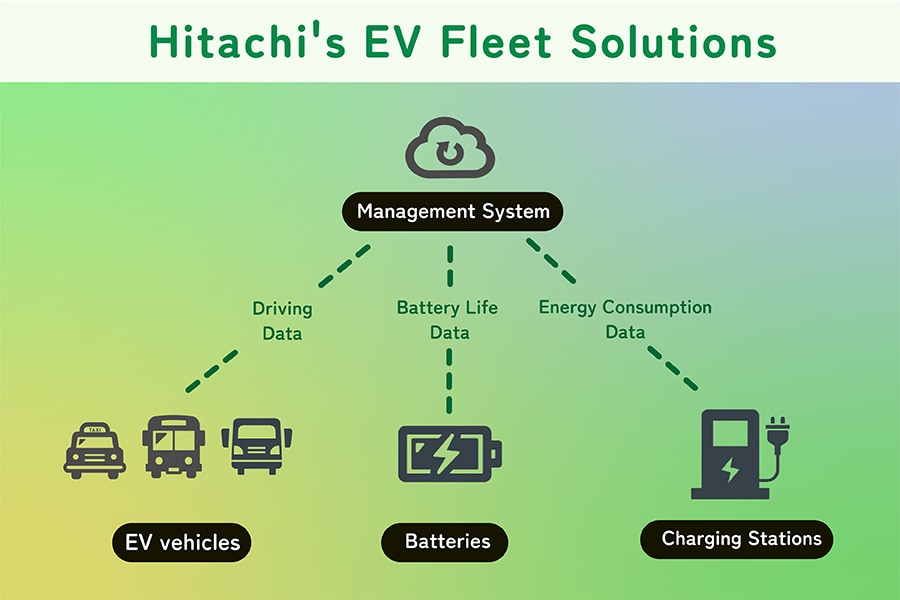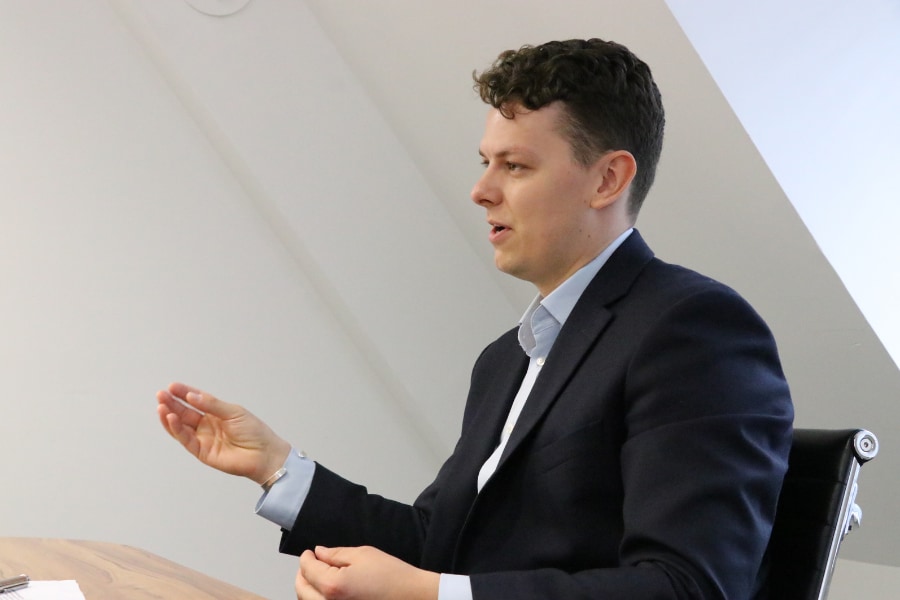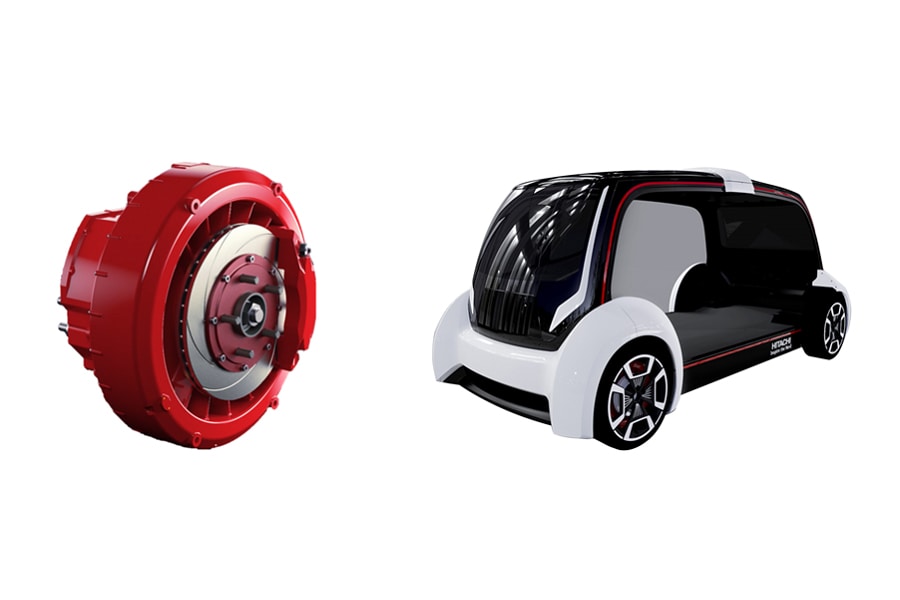Fleet Optimization: The Key to Boost EV Uptake and Achieve Decarbonization
Jan. 30, 2023
Urara Nagaoka

According to research conducted by Our World In Data, 20% of global carbon emissions come from transport. As countries worldwide look to identify and implement the most effective solutions to achieve global decarbonization, the electrification of transport provides a promising opportunity.
However, adoption of privately owned electric vehicles (EVs) alone is not enough to decarbonize our transport systems. It is essential to promote the electrification of commercial vehicle fleets such as buses, cabs, and trucks.
To support this transformation, Hitachi has begun to offer an end-to-end service that is helping fleet managers to transition from internal combustion engines (ICE) to an EV fleet, through the application of cutting-edge digital technology. We interviewed James Comer of Hitachi Europe about how the EV fleet solutions work and the latest cases in action.
Integrated management of EV vehicle fleets

Q: What is an “EV fleet”?
James Comer: When one hears the word “EV,” the first thing that comes to mind is passenger vehicles owned by individuals. However, the majority of vehicles in operation on the road are commercial vehicles such as buses, cabs, and trucks.
At Hitachi, we are working with our customers to replace these vehicles with EVs, by providing them with optimized charging solutions, battery financing and management, and by ensuring their depot energy infrastructure is capable of coping with this additional electricity demand. Hitachi is providing the technology as an end-to-end solution to transition vans, buses, and heavy goods vehicles to electric. Digital technology is crucial to manage and control these vehicles in an integrated manner as a fleet.
Our digital solutions will enable the reduction of CO2 emissions across society, and also offer significant benefits to business owners. Integrated management of EVs can provide real-time visibility of how much electricity is being used, so this kind of data can be used to flexibly adjust power consumption. Also, it can help business owners purchase electricity while taking the supply-demand balance of electricity into consideration, which will ultimately lead to cost reductions.

Q: How are you currently involved with Hitachi’s fleet decarbonization business?
James: I am the Government and External Affairs Lead in a team called Hitachi ZeroCarbon, where we work to promote the EV fleet solutions to the European region, and I’m involved in discussions and exchanges of ideas with the UK government on issues related to the conversion to EVs and the technologies needed to realize EV fleets.
Previously, I worked at Hitachi's consulting division and was involved in some large-scale infrastructure projects, as well as many other clients in Financial Services, Industrials, and beyond. After learning that a team with the mission of driving the transition to EV was about to be launched, I decided to make a fresh start and move to a new position, taking on greater responsibilities.
We only recently officially launched Hitachi ZeroCarbon, which is part of Hitachi Europe, in July 2021, but since its formation I have been witnessing how much impact we can have on society. Just the other day, I had the opportunity to attend a meeting of the UK Parliament to discuss with politicians about reducing CO2 emissions. Then, a few weeks later, I learned that what we discussed was approved by the Cabinet and published in a newspaper. I was very happy to see that my job has played a role in making a small change to society.
Hitachi’s Challenge at COP26
Q: Could you please talk about the EV bus initiative as launched in conjunction with the 26th Conference of the Parties to the United Nations Framework Convention on Climate Change (COP26)?
James: At COP26 held in Glasgow, UK, in November 2021, Hitachi ZeroCarbon was introduced in collaboration with First Bus, a major bus company operating throughout the UK. Their fleet of 148 buses in the city of Glasgow was converted to EV. Hitachi provided the batteries to be installed on the buses, charging spots at the bus depot, a smart charging system that monitors the charging status of all the vehicles, and a system to manage battery life, as well as managing the end-to-end decarbonization strategy.
One of the most-impressive features of this was smart charging, which enables real-time monitoring of charging stations installed throughout the city and the usage status of each vehicle. This system can signal each vehicle to charge and warn drivers not to charge more than needed during peak hours, when electricity rates are high. These features enable the consumption of electricity when necessary and only in the amount needed.
A system to manage battery life is also essential. The life of EV batteries is said to be about 8-10 years, but the more a battery is overused by high-speed driving and long hours of operation, the faster it deteriorates. Therefore, we have built a system that remotely visualizes battery degradation and gives an alert when there is any vehicle with a battery that is deteriorating rapidly. Furthermore, business owners can make use of this technology to improve battery-friendly driving techniques by comparing battery data with data collected from emergency braking, sudden acceleration, and other driving conditions.

Q: What outcomes has the collaboration with First Bus produced?
James: Through this initiative, we have estimated that we were able to contribute to the reduction of 5,000 tons of CO2 emissions per year across the 148 vehicles we have provided, with this number increasing as we bring further vehicles under management.
In addition, those who used the bus during COP26 commented that the ride was comfortable, acceleration of the vehicle was smooth, and that it was an exciting experience to go on a bus that does not emit any CO2. Also, what impressed me most was the reaction of the drivers.
At first, I thought that if I asked veteran First Bus drivers to change to an electric vehicle, they wouldn’t be happy. But instead, so many of them wanted to drive the bus that First Bus had to hold a selection process. I was surprised to hear them all say, "I would love to drive an environmentally friendly bus," and some drivers even started talking excitedly to passengers about the appeal of their EV bus.
Mission to stop climate change

Q: What are some of the difficulties in encouraging the EV transition?
James: There is still no case where an entire region has completely electrified all commercial vehicles on its roads, so no one has a clear answer on how to achieve this. For this reason, a flexible mindset and collaboration across organizational boundaries are crucial.
Also, many bus operators and transportation companies in Europe still have strong traditional business practices and values, so convincing and involving such stakeholders in the implementation fleet transition has been a challenge.
However, Hitachi is fortunate to be involved in large-scale infrastructure projects across the globe, so we have an abundance of human resources that can promote projects while respecting traditional business practices and coping with our customers’ level of understanding about the technology. Even if we come across a new issue in Europe, we can overcome it by gathering the knowledge of employees scattered in different regions, including Japan and the United States.
Q: What is the outlook for the future of fleet decarbonization?
James: EVs not only consume electricity but can also generate electricity when in operation. Thus, we can utilize these vehicles in EV fleets as storage batteries to be shared by the local community, and Hitachi has already begun proof-of-concept testing on a small scale.
Additionally, as data related to EVs is accumulated within the power management system, new services leveraging this data are being considered, including financial products such as automobile insurance and electric power service.
Overall, I believe what is most important in realizing the decarbonization of transport is not to think about how to gain a profit, but to value the thought that we must do it for our own future. We must do everything we can to keep global warming below 1.5°C, and this sense of mission is the motivation that pushes me every day.



